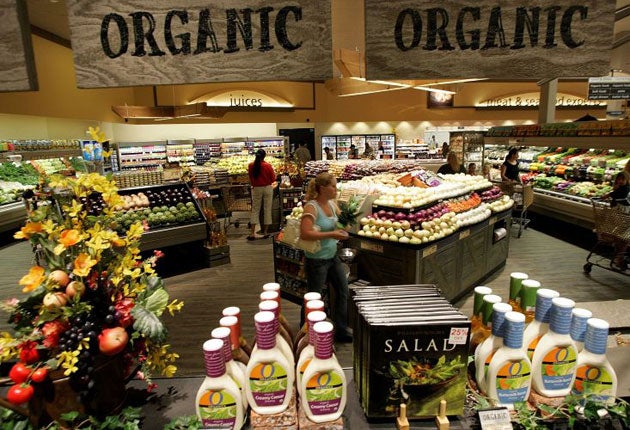Rise of organic food stalled by recession

Your support helps us to tell the story
From reproductive rights to climate change to Big Tech, The Independent is on the ground when the story is developing. Whether it's investigating the financials of Elon Musk's pro-Trump PAC or producing our latest documentary, 'The A Word', which shines a light on the American women fighting for reproductive rights, we know how important it is to parse out the facts from the messaging.
At such a critical moment in US history, we need reporters on the ground. Your donation allows us to keep sending journalists to speak to both sides of the story.
The Independent is trusted by Americans across the entire political spectrum. And unlike many other quality news outlets, we choose not to lock Americans out of our reporting and analysis with paywalls. We believe quality journalism should be available to everyone, paid for by those who can afford it.
Your support makes all the difference.A £100m hole was knocked in sales of organic food last year as shoppers opted for cheaper produce in the economic downturn.
Overall, sales fell by 5.9 per cent from £1.84bn to £1.73bn, according to research by the Soil Association, the country's biggest certifier of organic products.
The fall – outlined in the organisation's 2011 Organic Market Report, to be published today, dashed the Soil Association's prediction made last year of a 2 to 5 per cent recovery in 2010. However, it was half the 12 per cent slump in 2009, which ended 16 years of uninterrupted growth.
The fall also slowed in the second half of the year to around 2 per cent and continued to bottom out this year, according to the Organic Trade Board, which is running a £2m advertising campaign to promote organic food as tastier and kinder to animals and the environment.
Organic rules ban artificial fertilisers and pesticides and lay down higher standards for the keeping of pigs and poultry.
Amid concerns about the environment and food quality, the organic movement experienced a boom in the mid-noughties, with sales rising by up to 30 per cent a year.
However, as shoppers adjusted to a harsher economic climate last year, sales of organic fresh fruit and vegetables and dairy – which account for more than half of all organic sales – fell by 6.3 per cent and 2.7 per cent respectively. Fresh meat was down by 5.8 per cent.
Organic ready meals crashed 36 per cent, which the Soil Association put down to people cooking more cheaply from scratch.
By contrast, organic baby food continued its strong growth, jumping 10.3 per cent, and organic textiles – made fashionable by H&M and Zara – increased by 7.8 per cent.
The amount of land in organic production fell by more than 10 per cent, from 4.8 per cent to 4.2 per cent of all farmland, and the number of producers slipped from a record high of 7,896 to 7,567.
Production of organic vegetables and organic milk fell but cereal production increased, buoyed by high grain prices and strong demand for milling wheat.
The big supermarkets still clocked up £1.25bn in sales, 72 per cent of the total, but that was down by an above average 7.7 per cent on the previous year. Box scheme and mail-order deliveries grew by 1 per cent to £156m, probably because those customers have a stronger commitment to the movement.
The Soil Association pointed out that 86 per cent of households now bought organic products.
Despite the overall drop, the Soil Association was quietly confident about the future, saying that Tesco, Sainsbury's, Morrisons and the Co-op expected sales to level off this year while Waitrose and Marks & Spencer predicted a small rise.
"The outlook for 2011 is cautiously optimistic," it said. "Despite fragile consumer confidence in the wider economy, the report shows positive signs of resilience and recovery for the organic sector overall."
Huw Bowles, the chairman of the Organic Trade Board – funded by producers such as Yeo Valley and Organix – said the economy had been the main reason people had reduced their spending. "A couple of years ago, people thought it was the end of the world and nobody would be able to afford organic, but as time has gone on, people have realised that organic is still here and that the reasons to buy organic are still still valid," he said. "People are probably not buying as frequently and as much as they were two years ago."
Roger Mortlock, the deputy director of the Soil Association, said it would be "rash" to make predictions for the future. "The instability caused by climate change, population growth and resource depletion mean that business as usual in food and farming is not an option."
Join our commenting forum
Join thought-provoking conversations, follow other Independent readers and see their replies
Comments